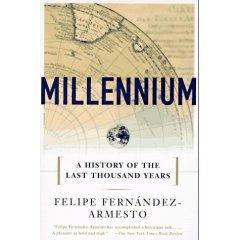
This book is undoubtedly worth reading. That being said, it must also be noted that it will be a little difficult if you do not possess a larger than average vocabulary and a more than high-school education in history. However, difficult or no, this book is both interesting and important. Published in 1996, the book tells tries to explore what the human history of the last millenium (thus the name) would look like to aliens who come upon Earth after our civiliation disappears.
His argument, in short, is that it would look to them nothing like what our contemporary historians portray it as being. For example, Eurocentric historians focus plenty on the middle ages, a five-hundred year period in European history. Well, Europeans were barbarians. Constantly at war, they were immoral, unhygienic, and a didn't contribute anything to the world technologically. The Middle East, on the other hand, hosted a flowering civilization that is the basis for today's advanced mathematics (i.e. we use Arabic numerals instead of Roman and they invented the zero for only the second time in all of human history). China had already formed one of the largest, most diverse empires on Earth, and a bureaucracy capable of governing its farthest reaches. Not to mention the Chinese are responsible for gunpowder and cannons (which Eurocentric history credits, but in an offhand way, as if that was the one thing they ever did). Africa was no land of primitive tribes and slaves either. Although black Africans did not build any pyramids, they had civilizations too. It's not like they couldn't look at the Egyptians and see how they did it. And Eurocentric histories always skip over American accomplishments (and I don't mean those by the colonizers, I mean the people who were always here). They conveniently ignore that corn (maize), tomatoes, beans, potatos, and squash all came from the Americas. And it was no accident! Americans cultivated those to become their principle food crops, foods which could support many more people than European or Asian crops.
Despite all this, most contemporary histories are written by westerners and they are very dismissive of the contributions of other parts of the world. If their version of history was correct, they'd have a right to be. But most histories today make it seem like the western world is mostly responsible for the shape of the entire world as it is today and that other cultures had much less part in shaping the world. The problem with that is that they're taking about 200 years of European dominance out of context and inflating it out of all proportion.
There was a very narrow window when European influence spread across the world. The European (not that there was such a place back then, but take it as a convenience) continent was dominated by Islamic Arabs and Turks. Even though not ruled by them, when your whole of existence is to defend yourself from an enemy, your existence is defined by the enemy. Europeans life was dominated by the outsiders until very recently. The Spanish only conqured the last "Muslim" outpost in 1492, and the Ottoman Empire was only defeated in 1922 (they owned a part of Europe until the end). The European powers only gained a disproportianate strength over the rest of the world in the 1600s, a power which was already fading in the 1700s. By the 1800s only the weakest of states still invested in colonial exploits (i.e. Belgians, Dutch, Germans, etc). Everyone else had already taken all the resources they were going to get. The one notable exception is of course the British empire, but they didn't start as early as the Spanish and their "rule" devolved into economic exploitation of natives in various parts of the world (basically long-distance extortion).
The point of all that is this: aliens would look at the world and in a span of 1000 years see about 200 where Europeans were dominant. Before that they would see that they were entirely unimportant in the scheme of things, and by the end of the millenium were fading back into a status quo of being less-than-or-equal-to the Asian powers. Lest anyone doubt that this is indeed the case, think about the fact that Russia, our cold-war opponent for 40 years, is Asian, or at best Eurasian. Think about what countries we worry about and watch now: Iraq (which is where?), Iran (neighbor to Iraq), China, N. Korea, and the surging economies of the "Asian Tigers" (Hong Kong, Taiwan, Singapore and S. Korea).
Europe: 200 years. Asia: 800 years. So from an outsider's viewpoint, which one is more important? Also, they would study how Europeans have managed to almost completely destroy the native cultures of the Americas. I won't say it's an anomaly exactly, but it's not exactly normal either. And it was due not to cultural sophistication or technological differences, but due to the fact that Americans' immune responses could not deal with the onslaught of European diseases. The aliens would view the new American's "Manifest Destiny" as a ridiculous belief, much like believing that if you were in the ring with Mike Tyson and somebody outside the ring shot him, you were destined to win anyway therefore you were better.
And all that aside, even if you love crap like "A Patriot's History of the United States" and are thinking this sounds like commie liberal propaganda, this book is interesting because this author just knows a lot about history and you will learn things that surprise you. In a way it's like that TV Show Connections , where you learn how all sorts of things were inter-related that you would never have guessed on your own.
Whew, that was quite a spiel. Anyway, as usual, I say "Read it!"
No comments:
Post a Comment